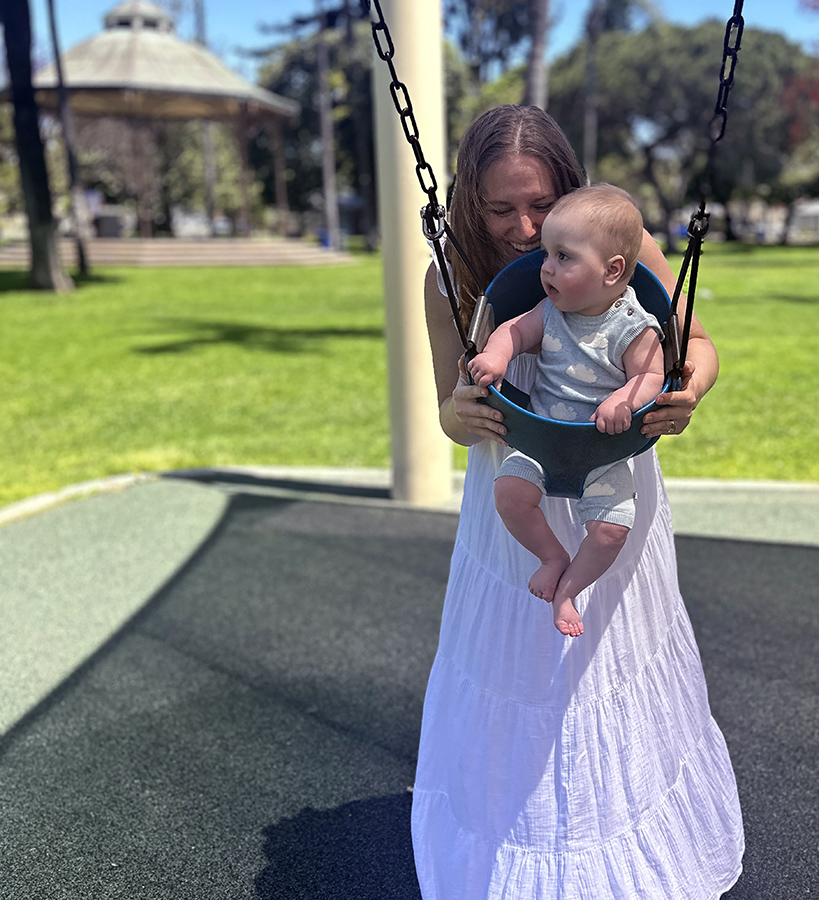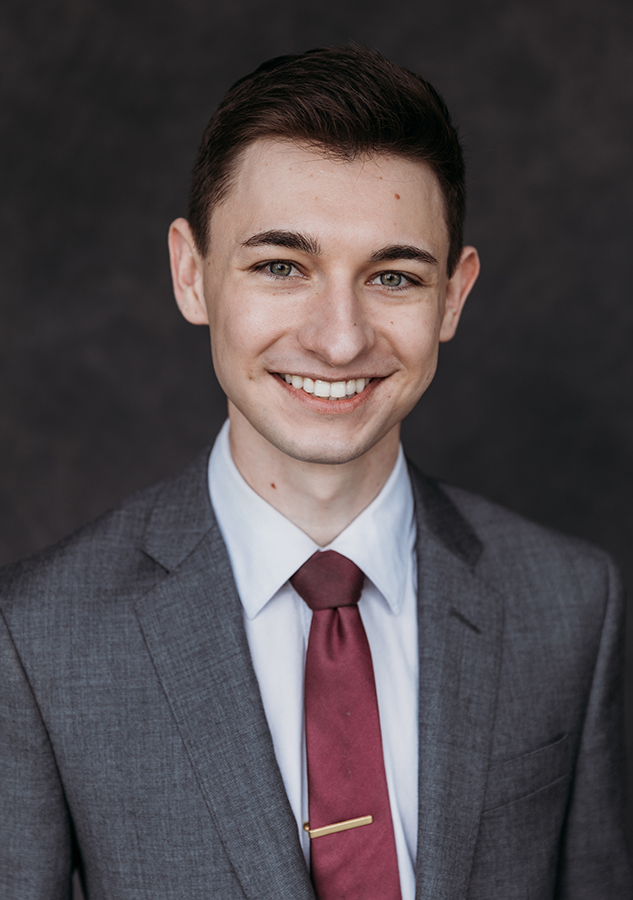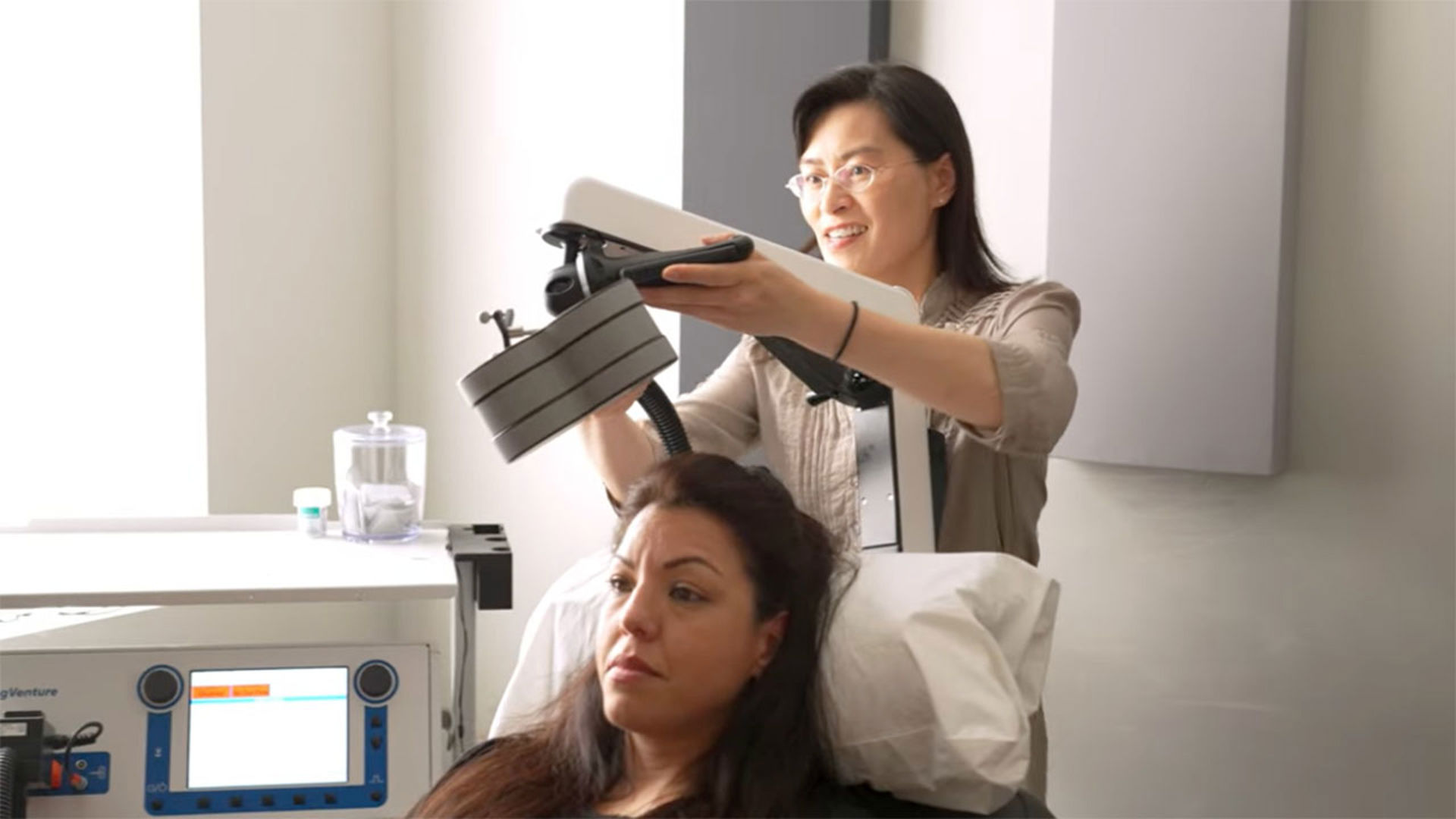
Katharine Unetic, her husband Paul Dubuke and son Rowan Unetic-Dubuke are able to enjoy family time after Unetic’s successful series of transcranial magnetic stimulation (TMS), which has been used for her treatment-resistant depression. Photo courtesy of Katharine Unetic
After the birth of her son in August 2024, Katharine Unetic was desperate to feel joy and excitement about her growing family. Instead, she felt consumed by depression and panic.
"I couldn’t provide anything more than the most basic care for my son — I always wanted to sleep, I cried all the time and I just wanted to crawl into a hole," Unetic remembers. "I got frustrated with him a lot, and it wasn’t his fault. I knew I needed help."
Unetic has suffered with depression and anxiety since childhood and was diagnosed with major depressive disorder at age 12. Medications and therapy have been mainstays throughout her life, but they didn’t touch her postpartum depression.
By the time the holidays rolled around in December, "I was in such a dark place. I couldn’t calm down, I couldn’t rest, I was constantly worrying — it was a debilitating time," she said.
 Katharine Unetic suffered sever postpartum depression after the birth of her son, Rowan. She has since found treatment through TMS therapy. Photo courtesy of Katharine Unetic
Katharine Unetic suffered sever postpartum depression after the birth of her son, Rowan. She has since found treatment through TMS therapy. Photo courtesy of Katharine Unetic
That’s when her doctor, Michael Wolfe, MD, resident psychiatrist at UC San Diego Health, recommended transcranial magnetic stimulation (TMS) therapy, a non-invasive, Food and Drug Administration (FDA) approved intervention for treatment-resistant depression that uses magnetic pulses to stimulate specific areas of the brain associated with dysfunction in depression.
Patients who try several types of unsuccessful treatments are often considered treatment-resistant, particularly those who suffer from major depressive disorder, which is considered the leading cause of disability worldwide according to the Centers for Disease Control and Prevention (CDC).
The CDC reports that depression is one of the most common mental illnesses, with 18.4% of Americans having been diagnosed with depression at some point in their lives. Of the patients who develop a bona fide major depressive disorder, approximately 30% have treatment-resistant depression, like Unetic.
"This was a particularly challenging period in Katharine’s life where she was dealing with chronic depression and anxiety, which significantly worsened after the birth of her child," Wolfe recalled. "I knew it was time to start looking into alternatives when we had maxed out several different classes of medications without getting relief from her symptoms."
A light in the darkness
First, Unetic began a recently FDA-approved neurosteroid, Zuranolone — a two-week course of treatment that she responded to only initially. TMS treatments followed, requiring daily treatments five days per week for six weeks, with each session lasting just up to 10 minutes.
During TMS treatments, a coil is placed on the head, which delivers targeted magnetic pulses to stimulate the neural networks that regulate mood and work to "reset" dysfunctional brain patterns. The FDA approved TMS for the treatment of major depressive disorder in 2008. Since then, it has also been approved to treat obsessive-compulsive disorder, smoking cessation, anxious depression and migraines. Its use is currently being studied for a variety of other mental health conditions, ranging from post-traumatic stress disorder to chronic pain.
"I had reached this point where I had to accept that my depression was deeper than what medication could take care of, "Unetic said. "I wanted to get better for my son — whatever it took.
 Cory Weissman, MD, PhD (left) and Xia Li, MD, PhD, measure TMS therapy on a patient. Kyle Dykes, UC San Diego Health
Cory Weissman, MD, PhD (left) and Xia Li, MD, PhD, measure TMS therapy on a patient. Kyle Dykes, UC San Diego Health
According to the National Institutes of Health, TMS is considered a safe and effective treatment for patients with major depressive disorder when standard treatment options fail. Approximately two-thirds of patients with treatment-resistant depression experience remission or their symptoms lessen by half after a full course of TMS.
Transformation to healing
With nervous anticipation, Unetic arrived at the UC San Diego Health interventional psychiatry clinic for her first treatment in January 2025, wondering how the magnetic pulses would feel on her scalp. As the magnets began working, she did feel zapping, tingling sensations, but they were not painful.
Just two TMS sessions in, Unetic noticed a profound change.
"My head was clear for the first time — it was a major relief. I had never felt that clear," she said with relief.
As the treatments continued, her mental clarity sharpened, she began looking forward to activities with her family and felt a relief and calming effect that was new to her.
 Michael Wolfe, MD, is a resident psychiatrist at UC San Diego Health. Photo courtesy of Michael Wolfe
Michael Wolfe, MD, is a resident psychiatrist at UC San Diego Health. Photo courtesy of Michael Wolfe
"For me, TMS treatment was life-altering. At first, I was dumbstruck that something was working — and then I got excited," she said, noting that she began looking forward to each session. "The feelings of clarity and the release of tension are incredible. I used to crawl out of my skin with anxiety and now I was looking forward to doing new things with my family and enjoying little things in a way I’d never been able to do before."
UC San Diego Health offers the most advanced TMS clinic in the region and was the first provider in San Diego to offer the treatment. Specializing in an integrated care approach, TMS therapy is often combined with psychotherapy, medication management and lifestyle interventions that foster holistic wellness.
"TMS can be a life-changing intervention for individuals with depression who do not find relief from standard treatments," said Cory Weissman, MD, PhD, assistant professor of psychiatry at University of California San Diego School of Medicine and medical director of interventional psychiatry at UC San Diego Health. "We are world leaders in TMS and other areas of interventional psychiatry and fuse leading-edge treatment approaches with exceptional care. Our clinical program also works closely with the interventional psychiatry research program at UC San Diego School of Medicine, where study of predictive biomarkers and treatment personalization is guided by advances in our understanding of how the brain is affected by mental illness."
Unetic’s story is a powerful reminder at the close of Mental Health Awareness Month that creating a sustainable path to wellness may require combining treatments such as medications, psychotherapy and TMS to provide the most robust, lasting mental health improvements.
"Katharine’s transformation has been profound," Wolfe said. "When I saw her after just the first few TMS sessions, she was already describing improvements in mood, motivation, anxiety and her ability to enjoy life."
Wolfe said he and members of UC San Diego Health’s interventional psychiatry team want patients to know that TMS is a safe, non-invasive and evidence-based option for those with treatment-resistance depression.
"It is not a last resort — it’s an essential part of the toolkit for treating depression, especially when medications haven’t provided adequate relief," he said, adding that patients can consider TMS after not benefiting from as few as one or two medication options.
Unetic and her husband have discovered newfound hope in treating her depression through TMS.
"To be able to experience joy in the little things my son does is incredible," Unetic said. "I have suffered with depression for most of my life, so it’s been a big relief to have found a solution that really works for me."

Transcranial magnetic stimulation (TMS) offers new hope for individuals whose depression hasn’t responded to traditional treatments. As one of the region’s most advanced TMS clinics, we combine science with compassionate, personalized care because treating depression means caring for the whole person.
TMS Therapy
TMS can reset brain networks to combat treatment-resistant depression.



